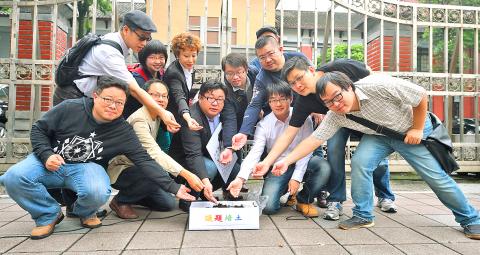A group of authors and professors of literature yesterday gathered outside the Legislative Yuan in Taipei to protest against the new high-school Chinese language curriculum which reincorporates a high percentage of classical Chinese material while neglecting Taiwanese and contemporary literature.
Na Su-phok (藍士博), one of the founders of the Alliance of the Young Safeguarding Taiwanese Literature and History, said that while concerns have been raised against the adjustments made to the history and civil education curriculum guidelines, there have been relatively few objections made public against the adjusted curriculum for Mandarin Chinese-language study.
However, that does not mean that the adjusted Chinese-language curriculum is problem-free, Na said.

Photo: Wang Min-wei, Taipei Times
“On the contrary, the problem is serious to the point that [the curriculum] is in the intensive care unit,” Na said.
Chu Yu-hsun (朱宥勳), a young author of several books and editor of anthologies of contemporary Taiwanese fiction and essays, said that the percentage of classical Chinese has been raised from 55 percent to 65 percent, with less flexibility.
What is more, according to Chu, a subject called “Chinese culture basic materials” has been singularly highlighted in the new guidelines, which suggests that is to be set up as an elective.
Classical Chinese literature is set to take up 72 percent of the allocated learning hours for Chinese-language study, Chu said.
He opposed the arrangement, saying that the curriculum should be designed to introduce young students to literature “from recent to ancient times and from easily accessible texts to works that require further interpretation.”
Earlier this week, another group of academics also drew attention to the new Chinese-language curriculum.
Referring to themselves as the Alliance for Saving the Education of Chinese Language, the group campaigned for even more class hours for Chinese and the adaptation of “Chinese culture basic materials” as a required course.
The alliance, led by National Taiwan University political science professor Chang Ya-chung (張亞中), who is also the chairman of the pro-unification Chinese Integration Association, has said that younger generations — without the cultivation of Chinese culture — have become empty, “with no identity, confidence, patience, vision, direction or viewpoint.”
Chang also said that more Chinese-language learning hours would equate to “more filial piety and sibling love.”
Former Soochow University president and alliance member Liu Yuan-chun (劉源俊) said he worried that Taiwan “would become the next Philippines,” if Chinese culture continued to lose its influence in public education in Taiwan.
Their comments have since been widely ridiculed and criticized as a “great Chinese superiority complex,” and as examples of explicit racism for deeming other cultures to be less sophisticated and less worthy of respect.

Alain Robert, known as the "French Spider-Man," praised Alex Honnold as exceptionally well-prepared after the US climber completed a free solo ascent of Taipei 101 yesterday. Robert said Honnold's ascent of the 508m-tall skyscraper in just more than one-and-a-half hours without using safety ropes or equipment was a remarkable achievement. "This is my life," he said in an interview conducted in French, adding that he liked the feeling of being "on the edge of danger." The 63-year-old Frenchman climbed Taipei 101 using ropes in December 2004, taking about four hours to reach the top. On a one-to-10 scale of difficulty, Robert said Taipei 101

Taiwanese and US defense groups are collaborating to introduce deployable, semi-autonomous manufacturing systems for drones and components in a boost to the nation’s supply chain resilience. Taiwan’s G-Tech Optroelectronics Corp subsidiary GTOC and the US’ Aerkomm Inc on Friday announced an agreement with fellow US-based Firestorm Lab to adopt the latter’s xCell, a technology featuring 3D printers fitted in 6.1m container units. The systems enable aerial platforms and parts to be produced in high volumes from dispersed nodes capable of rapid redeployment, to minimize the risk of enemy strikes and to meet field requirements, they said. Firestorm chief technology officer Ian Muceus said

MORE FALL: An investigation into one of Xi’s key cronies, part of a broader ‘anti-corruption’ drive, indicates that he might have a deep distrust in the military, an expert said China’s latest military purge underscores systemic risks in its shift from collective leadership to sole rule under Chinese President Xi Jinping (習近平), and could disrupt its chain of command and military capabilities, a national security official said yesterday. If decisionmaking within the Chinese Communist Party has become “irrational” under one-man rule, the Taiwan Strait and the regional situation must be approached with extreme caution, given unforeseen risks, they added. The anonymous official made the remarks as China’s Central Military Commission Vice Chairman Zhang Youxia (張又俠) and Joint Staff Department Chief of Staff Liu Zhenli (劉振立) were reportedly being investigated for suspected “serious

American climber Alex Honnold is to attempt a free climb of Taipei 101 today at 9am, with traffic closures around the skyscraper. To accommodate the climb attempt and filming, the Taipei Department of Transportation said traffic controls would be enforced around the Taipei 101 area. If weather conditions delay the climb, the restrictions would be pushed back to tomorrow. Traffic controls would be in place today from 7am to 11am around the Taipei 101 area, the department said. Songzhi Road would be fully closed in both directions between Songlian Road and Xinyi Road Sec 5, it said, adding that bidirectional traffic controls would